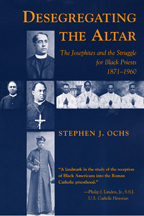
500 pages / 6.00 x 9.00 inches / no illustrations
African-American Studies | History / American History
Historically, black Americans have affiliated in far greater numbers with certain protestant denominations than with the Roman Catholic church. In analyzing this phenomenon scholars have sometimes alluded to the dearth of black Catholic priest, but non one has adequately explained why the church failed to ordain significant numbers of black clergy until the 1930s. Desegregating the Altar, a broadly based study encompassing Afro-American, Roman catholic, southern, and institutional history, fills that gap by examining the issue through the experience of St. Joseph’s Society of the Sacred Heart, or the Josephites, the only American community of Catholic priests devoted exclusively to evangelization of blacks.
Drawing on extensive research in the previously closed or unavailable archives of numerous archdioceses, diocese, and religious communities, Stephen J. Ochs shows that, in many cases, Roman catholic authorities purposely excluded Afro-Americans from their seminaries. The conscious pattern of discrimination on the part of numerous bishops and heads of religious institutes stemmed from a number of factors, including the church’s weak and vulnerable position in the South and the consequent reluctance of its leaders to challenge local racial norms; the tendency of Roman Catholics to accommodate to the regional and national cultures in which they lived; deep-seated psychosexual fears that black men would be unable to maintain celibacy as priests; and a “missionary approach” to blacks that regarded them as passive children rather than as potential partners and leaders.
The Josephites, under the leadership of John R. Slattery, their first superior general (1893–1903), defied prevailing racist sentiment by admitting blacks into their college and seminary and raising three of them to the priesthood between 1891 and 1907. This action proved so explosive, however, that it helped drive Slattery out of the church and nearly destroyed the Josephite community. In the face of such opposition, Josephite authorities closed their college and seminary to black candidates except for an occasional mulatto. Leadership in the development of a black clergy thereupon passed to missionaries of the Society of the Diving Word. Meanwhile, Afro-American Catholics, led by Professor Thomas Wyatt, refused to allow the Josephites to abandon the filed quietly. They formed the Federated Colored Catholics of America and pressed the Josephites to return to their earlier policies; they also communicated their grievances to the Holy See, which, in turn, quietly pressured the American church to open its seminaries to black candidates. As a result, by 1960, the number of black priests and seminarians in the Josephites and throughout the Catholic church in the United States had increased significantly.
Stephen Ochs’s study of the Josephites illustrates the tenacity and insidiousness of institutional racism and the tendency of churches to opt for institutional security rather than a prophetic stance in the face of controversial social issues. His book ably demonstrates that the struggle of black Catholics for priests of their own race mirrored the efforts of Afro-Americans throughout American society to achieve racial equality and justice.
Stephen J. Ochs, the Lawler Chair of History at Georgetown Preparatory School in North Bethesda, Md., is the author of A Black Patriot and a White Priest: André Cailloux and Claude Pashal Maistre in Civil War New Orleans, Desegregating the Altar: The Josephites and the Struggle for Black Catholic Priests, 1871-1960 and, most recently, A Cause Greater Than Self: The Journey of Captain Michael J. Daly, World War II Medal of Honor Recipient.
“Stephen Ochs has given us a textured, very well-researched, delightfully written, perceptively interpreted account of American Catholic efforts to liberate their church from cultural captivity.”—Church History
“Stephen J. Ochs provides an excellent example of the new Catholic history that presents a critical and often censorious view of the Catholic past. . . . [A] wide-ranging and magnificently researched book.”—American Historical Review
“Based on a wide range of primary sources and carefully crafted, Ochs’s work is a poignant study at a time when, globally, Catholicism has become a non-white majority church.”—History
“Och's work is based on a rigorous scrutiny of many archives and great familiarity with relevant studies. More than ten years of research have gone into it, and we may congratulate him for this book.”—Catholic Historical Review
“[A] thoroughly researched and immensely well-written, strongly narrative-based book.”—History
Found an Error? Tell us about it.